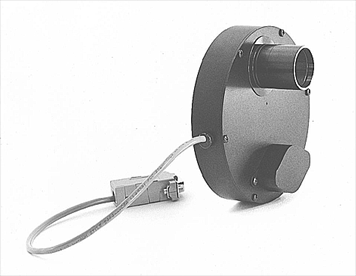 |
| Model CFW-8 Color Filter Wheel |
| * ACCESSORIES FOR SBIG CCD CAMERAS * |
 |
| Model CFW-8 Color Filter Wheel |
SBIG pioneered tricolor imaging for amateurs by developing hardware and software to register and color balance Red, Green, and Blue images that display spectral emission of deep space objects. When interference filters are carefully selected to match the spectral regions of ionized gases the images taken through the filters can be summed together to represent the distribution of these gases. SBIG designed the following interference filters for use with the CFW-8A:
Color Filter Passbands
| Filter | Passband (nm) |
| Red | 612-670 |
| Green | 488-574 |
| Blue | 392-508 |
Tricolor images are taken through the CFW-8A Color Filter Wheel and
processed with CCDOPS
or CCDSoftV5 software. The primary color images are taken through Red,
Green and Blue
filters. After the images are taken they are processed with the
software to co-align the
Red, Green and Blue images. The co-aligned image is then color balanced
on the computer
monitor to become a tricolor RGB image, which can then be saved to
disk. CCDOPS software
also allows the user to perform image processing functions such as
smoothing and
sharpening as well as saving images in TIFF format.
The CFW-8 system is designed to be "direct connected" to the Models
ST-7/8/9/10/2000 imaging cameras for a thinner, more rigid
mounting. An optional
male-to-male t-thread adapter is also available allowing easier (but
less rigid)
attachment and detachment for occasional use. On the front end a
variety of optional
T-Thread accessories are available including 1.25 inch and 2 inch
diameter nose pieces as
well as a "Visual Back Adaptor" for direct connection to SCT's. A
new
optional accessory is the AO
adapter plate which
makes it possible to firmly connect the camera, filter wheel and
AO-7 without using
a screw-in t-thread adapter.
The CFW-8 is operated through the CCDOPS software and utilizes a
closed loop stepper
motor system with positional accuracy of ±0.01 inches. It
holds up to five standard
1.25" diameter thread-in filters. Also supplied with the unit are Red,
Green, and
Blue (RGB) interference filter sets and a clear filter (focusing). The
new SBIG RGB
filters also block Infrared (IR) so an inline IR Blocking filter is no
longer required.
These filters are mounted in standard size cells that normally fit into
1.25"
eyepiece barrels. The CFW-8 adds back focus of approximately 1 inch.
Although some examples of tricolor imaging are shown in this catalog it
is difficult to
display the wide range of techniques that our customers have developed.
The CFW-8 can
produce photographic quality tricolor images that rival color
astrophotographs.
However, these RGB images also contain an entirely new and added level
of valuable
information; the identification and distribution of different ionized
gasses in an object.
SBIG also furnishes precision UBVRI filter sets with the Model CFW-8,
filters which allow
the user to perform color photometry to measure the classification and
temperature of
objects.
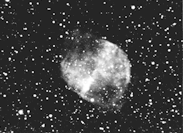 |
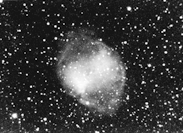 |
| Red Image | Green Image |
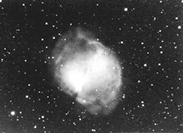 |
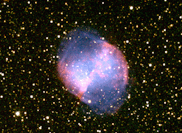 |
| Blue Image | Combined Image |
|
Note: The three separate Red
Green and Blue CCD images |
|
|
THE RGB PROCESS IN THREE SIMPLE STEPS |
| 1. Using the CFW-8 and CCDOPS software take three images with relative exposure ratios of (typically) 1:1:1.6 through Red, Green,and Blue filters respectively. |
| 2. Using CCDOPS COLOR or the new CCDOPS for Windows software register the three images and color balance them on the computer monitor. |
| 3. The result is a tricolor image.
|
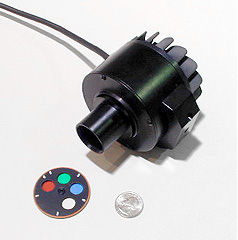 |
| Model CFW-5C Color Filter Wheel |
The CFW5C filter wheel is designed for the ST-5C and ST-237/A cameras. It operates the same as the larger CFW8A except that it fits inside the camera head. The filters used in the CFW5C are exceptionally high quality RGB filters designed for parfocal operation at the fast focal ratio of Celestron's Faster optical systems. The band passes are also slightly different from the larger filters to better match the spectral response of the TI CCDs used in these cameras.
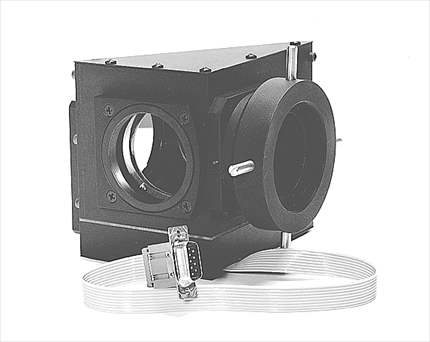 |
| Model AO-7 Adaptive Optics System |
The Model AO-7 has been specifically designed to enable an ST-7 or
ST-8 user to obtain
the ultimate in image resolution that his/her telescope and site can
achieve. SBIG has
exploited the second guiding CCD detector in these imaging cameras to
stabilize stellar
images, enhancing resolution. The AO-7 system has two components: a
high speed tip-tilt
mirror for atmospheric correction, and new image enhancement software
implementing the
Lucy-Richardson algorithm.
TIP-TILT HIGH SPEED GUIDING
Utilizing the second guiding CCD as an imaging sensor the guide
star's position is read
out at rates up to 40 times a second, and the tip-tilt mirror adjusted
to hold the star on
the designated pixel for the length of the imaging CCD's exposure. The
tip-tilt mirror
moves and settles to within 20% of the commanded position in a mere 10
milliseconds,
dramatically faster response than any telescope drive is capable of
achieving. The result
is sharper stars, and more clearly defined nebular features. As a
general rule one can
guide at 10 frames a second on a 10th magnitude star with a 10 inch
(25cm) telescope. The
range of the mirror for the Model ST-7 is ±5O pixels or 2
arcminutes of correction with
an 80 inch focal length telescope, enough to accomodate the periodic
error of many mounts
without bothering to correct the RA drive axis directly. The Model AO-7
can do all of the
guiding. Inexpensive telescope mounts are now entirely capable of
producing well guided
images.
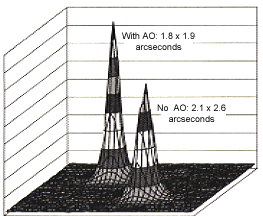 |
| As can be seen in this
comparison image the AG gives an improvement in core intensity and halfwidth, improving the image resolution. |
LUCY-RICHARDSON IMAGE ENHANCEMENT
SBIG, in association with Benoit Schillings and Brad Wallis, has
developed a
Lucy-Richardson image sharpening program that produces dramatic
improvements in image
detail, visually at least a 2x improvement. The algorithms used are
similar to those used
on the Hubble Space Telescope images. The results are the best we
have ever seen
from amateur telescopes.
The enhancement program is Windows 95 compatible, and resembles SBIG's
new Windows
processing products, not the well known CCDOPS which runs in the DOS
environment. In
addition to the enhancement capability, the program allows the display
of multiple images,
modification of background and range to enhance visibility of detail on
the monitor, a
crosshairs mode for inspecting pixel values, negative image display
mode, and horizontal
and vertical image rotation.
The AO system can be retrofitted to all Model ST-7 and ST-8 CCD imaging
cameras by
inserting a new ROM and loading the upgraded software that accompanies
the system. This
can be easily done by the user at his site. This remarkable system
promises to have a
profound effect on CCD imaging by reducing the atmospheric turbulence,
wind induced
vibrations, and eliminating the remaining periodic errors in most
telescope drives.
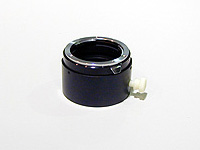 |
CLA-1 CAMERA LENS ADAPTER mates the Models ST-4, ST-4X, or ST-5 (not ST-5C) with popular camera lenses for wide field imaging. Currently available adaptors are for Pentax bayonet, Canon, Olympus, Nikon, or Minolta.
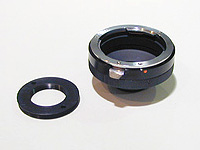 |
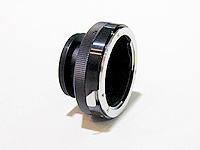 |
CLA-5 CAMERA LENS ADAPTER mates the Models ST-5C, ST-237, STV, PixCel 255 and PixCel 237 with popular camera lenses for wide field imaging. Currently available adaptors are for Pentax bayonet, Canon, Olympus, Nikon.
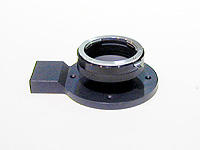 |
CLA-6 CAMERA LENS ADAPTER mates the Models ST-6, ST-6A, and ST-6B with popular camera lenses for wide field imaging. Adapters are currently available for Pentax bayonet, Canon, Olympus, Nikon, or Minolta.
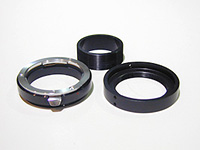 |
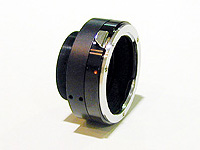 |
CLA-7 CAMERA LENS ADAPTER mates the Models ST-7, ST-8 and ST-9 with popular camera lenses for wide field imaging. Adapters are currently available for for Pentax bayonet, Canon, Olympus, or Nikon.
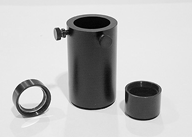 |
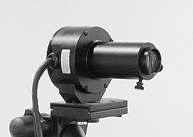 |
|
FR-237 focal reducer and extensions |
FR-237 in eFinder configuration |
FR-237 FOCAL REDUCER LENS threads directly into the 1.25" nosepiece of an ST-5C, ST-237, STV, PixCel 255 or PixCel 237. When the focal reducer lens is used on an f/10 SCT it will increase the field of view and reduce exposures by several times. It can provide unvignetted operation at f/5.95 or f/3.75 by selecting a fixed mechanical extension tube. The same lens when used with the eFINDER ASSEMBLY extension tube turns the FR-237 lens into an ultra compact f/4 telescope of 100mm focal length for wide field views or autoguiding without an additional optical tube. (The focal reducer lens only may also be used with the ST-4 and old model ST-5 cameras).
FW4 FOCUSING RING COLLAR to establish the correct focus position for the Model ST-4 in a draw tube. Typically used in an off-axis guider for repeatible focus.
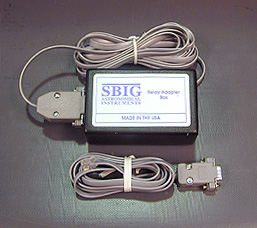 |
RELAY ADAPTER BOX is used with any drive system that does not support the Models ST-5C, ST-237, ST-7, ST-8, ST-9, ST-10, ST-2000 digital interface. This unit provides four SPDT relays (like the Model ST-4 interface) and offers complete isolation of the camera from the hand controller electronics.
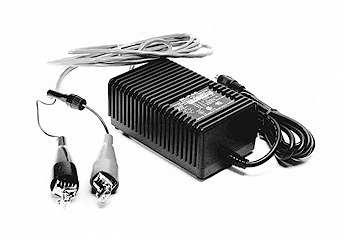 |
| 12 Volt D.C. Power Supply |
12 VOLT D.C. POWER SUPPLY allows the user to operate Models ST-7 and ST-8 imaging camera systems in remote locations where no line voltage is available. The power supply is furnished with Red and Black alligator clips for connection to a 12 volt battery (ie., marine, auto, etc.) in field operation.
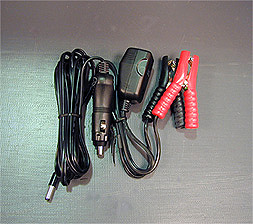 |
12VDC power cable for the ST-5C, ST-237/A and STV. This cable will also work with the older cooling booster accessory that required a separate 12VDC power supply. The adapter includes battery clips and a cigarette lighter adapter plug. The tip is correctly polarized for SBIG cameras requiring a center negative plug.
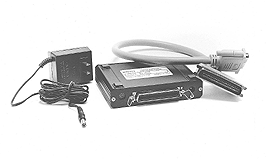 |
| Mac/SCSI Interface Box. |
Mac/SCSI INTERFACE BOX allows users to operate with a Macintosh computer by adapting the Mac's SCSI port to emulate a PC parallel port. This assembly is required for Mac operation with our Models ST-7, ST-8, PixCel 255 and PixCel 237 CCD imaging cameras.
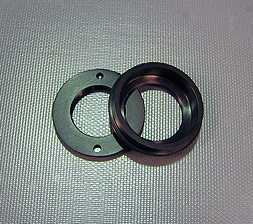 |
The MALE-TO-MALE T-THREAD ADAPTER (on top) allows a quick connection of the CFW8A to the ST-7/8/9/10/2000 cameras for temporary use without having to hard fasten the filter wheel to the camera body.
The T-THREAD TO C-MOUNT ADAPTER (on bottom) lets users of the ST-5C, ST-237/A and STV cameras attach a c-mount lens for wide field imaging.
The T-THREAD VISUAL BACK (not shown) allows users to rigidly mount the CCD imaging camera head to the rear of an SCT. The adaptor screws onto the rear bulkhead of the SCT and then screws directly onto the front of the CCD imaging camera head. This is a prefered method of mounting over inserting the CCD imaging camera into a draw tube with a single locking screw to support it.
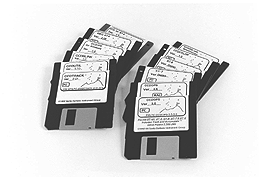 |
| Software for CCD imaging & processing. |
CCDTRACK SOFTWARE (now free) allows the user to transfer all autoguiding functions from the Model ST-4 to a remote PC. The PC can be located up to 100 feet distance and complete control of all tracking functions are through the PC keyboard.
CCDBLINK SOFTWARE (now free) allows the user to load two images files, align them with sub-pixel accuracy, then blink the display between the two images. Fixed objects remain steady whereas objects which have moved or changed in brightness will blink. This program uses image files from the Model ST-4.
CABLES
SBIG offers a wide range of extra cables to our customers. Cables for
the CCD head, serial
port, parallel port, power, and many other cables. Please contact us
for information on
these items.
UBVRI PHOTOMETRY
FILTER SETS
SBIG offers a selection of scientific grade UBVRI spectral filters
for use in our CFW-8 Color Filter Wheel.
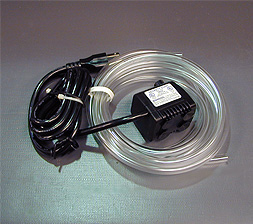 |
An optional water pump and clear tubing are available for cameras such as the ST-7XE, ST-8XE, ST-9XE, ST-10XE, ST-10XME and ST-2000XM that accept water circulation to improve their cooling performance.
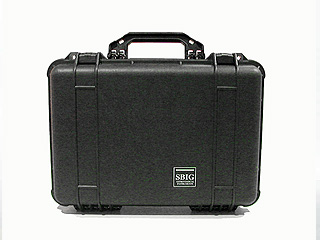 |
CASES
Custom hard shell
carrying cases are standard accessories for the
ST-7XE/XME Standard and Deluxe, ST-8XE/XME, ST-9XE, ST-10XE/XME, and
ST-2000XM/XCM
cameras. The same case with custom foam can be ordered separately
for older ST model
cameras.
SBIG is a company devoted to advancing the electonic imaging field
with new equipment
and techniques; a company dedicated to helping our customers acheive
success. Just look at
the quality of the CCD image shown below. It was taken by a student on
the first night he
received our imaging camera. That's success! We hope you will contact
us if you have any
questions or would like more information on about our products.
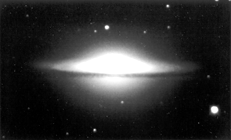 |
| First image taken by a student
with our Model ST-8 CCD Imaging Camera. |
Revised:
April 14, 2005 08:49:04 AM.
Copyright © 1998 Santa Barbara Instrument Group, Inc. All
rights reserved.
Please report any problems with this page directly to
the Webmaster